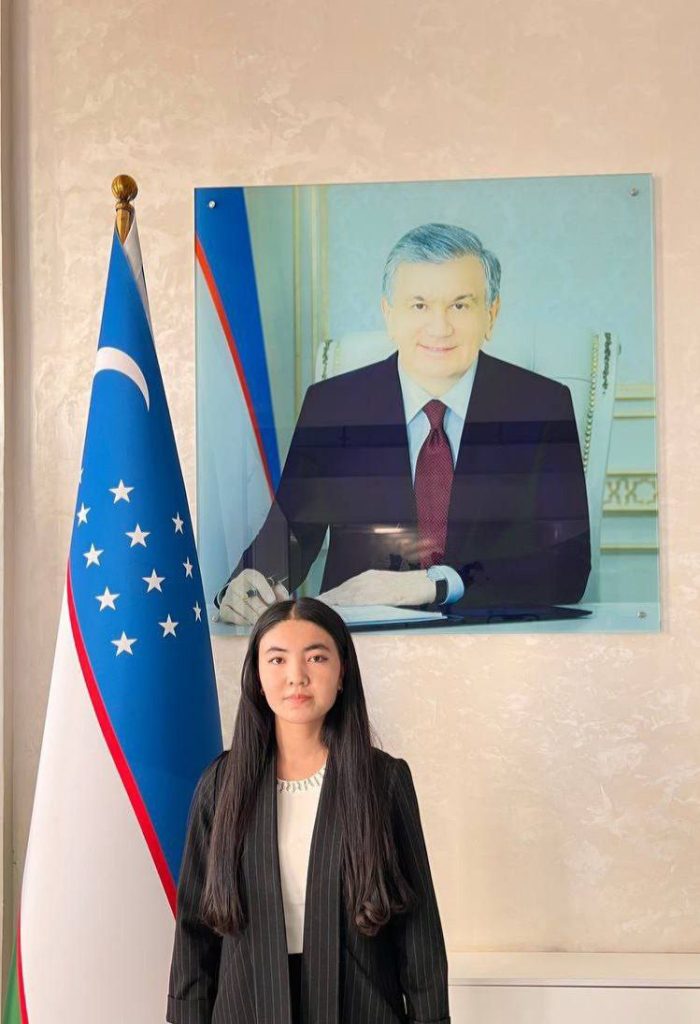The Role of Artificial Intelligence in Developing Students’ Critical Thinking Skills
To’laganova Muxlisa G’ulom qizi
A second-year student
at the English Philology Faculty of UZSWLU
Email: tolaganovamuxlisa6@gmail.com
Scientific adviser: Xolmatova Maxbubaxon Axmadjon qizi
Teacher
at the English Philology Faculty of UZSWLU
Email: environmental.roughton@gmail.com
Abstract. This study examines the role of Artificial Intelligence (AI) in enhancing students’ critical thinking skills within contemporary educational context. Using a literature-based analysis, the research investigates how AI-driven tools facilitate personalized learning, interactive problem-solving, and adaptive feedback mechanisms. The findings suggest that AI can significantly improve students’ metacognitive reflection, analytical reasoning, and evaluative judgement when integrated thoughtfully into teaching practices. Ethical considerations, including cognitive overreliance, algorithmic bias, and data privacy concerns, are discussed to emphasize the need for responsible implementation. The stud highlights the essential role of educators in mediating Ai-supported learning, ensuring that technology serves as a cognitive partner rather than a substitute for human guidance. By combining Ai capabilities with effective pedagogical strategies, students are empowered to develop autonomous, reflective, and analytically capable thinking skills. These insights offer valuable guidance foe educators, policymakers, and researchers seeking to optimize AI integration in education while maintaining ethical and pedagogical standards.
Key Words. Artificial Intelligence, Critical thinking, Personalized learning, Educational Technology, Metacognition, Pedagogy
Introduction
In the past two decades, Artificial Intelligence (Al) has evolved from a futuristic concept into a transformative force that reshapes various aspects of human life, including education. Originally designed to perform automated and repetitive tasks, Al has advanced to encompass sophisticated cognitive functions such as language processing, reasoning, and decision-making. The introduction of Al into education began in the 1960s with early intelligent tutoring systems like SCHOLAR and PLATO, which sought to individualize instruction. However, technological and pedagogical shifts in the 21st century have expanded Al’s educational role beyond automation positioning it as a collaborative partner that can foster higher-order thinking and creativity among students. Today, Al is no longer merely a tool for information delivery, it has become an adaptive system capable of engaging learners in critical inquiry and self-regulated reflection.
The integration of Al in education aligns with the growing emphasis on 21st-century skills, where critical thinking has emerged as one of the most essential competencies for learners to navigate complex, information-rich environments. Critical thinking is generally defined as the ability to analyze, evaluate, and synthesize information to make reasoned and reflective judgments. It involves questioning assumptions, identifying patterns, and drawing conclusions based on evidence rather than intuition. The cultivation of these skills is not only vital for academic success but also for lifelong learning and civic engagement. As the digital landscape becomes increasingly saturated with algorithm-driven content, the capacity to think critically to differentiate between fact and bias, evidence and opinion -becomes indispensable. Consequently, educators are exploring how Al-based systems might serve as cognitive scaffolds to strengthen students’ reasoning abilities and reflective judgment. Understanding how Al can contribute to the development of critical thinking requires a brief examination of its theoretical foundations in educational psychology.
The roots of critical thinking in pedagogy can be traced back to John Dewey, who conceptualized reflective thinking as “active, persistent, and careful consideration of a belief or form of knowledge.” Dewey’s theory emphasized learning through experience and inquiry principles that align closely with how Al-powered environments engage students through exploration and feedback. Later, Bloom’s Taxonomy provided a structured hierarchy of cognitive processes – from remembering and understanding to analyzing, evaluating, and creating which remains a cornerstone in assessing thinking skills. Contemporary interpretations of critical thinking, such as those by Ennis and Facione, highlight the importance of logical reasoning, metacognition, and open-mindedness. When viewed through this theoretical lens, Al has the potential to stimulate these cognitive dimensions by providing personalized, interactive, and adaptive learning experiences that prompt students to reflect, evaluate, and solve problems independently.
The intersection of Al and critical thinking presents a unique opportunity for pedagogical innovation. Intelligent learning systems can analyze student responses, provide tailored feedback, and simulate real-world scenarios that challenge learners to apply abstract reasoning in practical contexts. Adaptive learning technologies, for example, adjust task complexity in real time, ensuring that students operate within their zone of proximal development a concept introduced by Vygotsky that emphasizes the balance between support and autonomy in learning. By interacting with Al-based feedback loops, students can become more aware of their reasoning patterns, recognize cognitive biases, and refine their analytical strategies.
At the same time, such technologies raise philosophical and ethical questions about the role of human judgment, agency, and creativity in an Al-mediated learning environment. Despite its growing potential, the relationship between Al and critical thinking remains underexplored in both empirical and conceptual research. Many existing studies focus on the technical aspects of Al in education algorithmic efficiency or data-driven such as personalization rather than its cognitive or philosophical implications. This gap underscores the need for scholarly attention to how Al can be used pedagogically to nurture rather than replace human reasoning. The current study addresses this gap by analyzing existing literature and conceptual frameworks to determine how Al can effectively enhance students’ critical thinking skills, what risks may emerge from its misuse, and how educators can balance automation with autonomy.
Therefore, the aim of this paper is threefold:
1. To explore how Al technologies can facilitate the development of students’ critical thinking skills.
2. To identify potential challenges, such as cognitive dependence or ethical limitations, that may accompany Al integration in learning.
3. To propose pedagogical strategies that enable educators to leverage Al responsibly, ensuring it functions as a supportive tool for intellectual growth rather than a substitute for human thought.
Through this conceptual analysis, the paper contributes to a deeper understanding of the cognitive, ethical, and pedagogical dimensions of Al in education offering insights into how technology and human reasoning can coexist in cultivating critical, autonomous, and reflective learners.
Methods
Data sources
This study employs a literature-based and conceptual approach to investigate the role of Artificial Intelligence (AI) in developing students’ critical thinking skills. No empirical data collection was conducted; instead, the analysis draws on previously published scholarly articles, books, and policy reports. These sources were selected based on their relevance to Al applications in education, focus on cognitive development and critical thinking, and credibility within the academic community. Primary sources include peer-reviewed journal articles published between 2016 and 2024, academic books addressing Al in pedagogy, and institutional reports from recognized educational organizations. Literature focusing solely on technical Al features without pedagogical implications was excluded to ensure the analysis remains focused on educational outcomes and cognitive development.
Analytical Framework
The study’s analytical framework is structured around three key dimensions:
- Personalized and adaptive learning: examining how Al adjusts content, pace, and difficulty according to individual learners’ needs.
- Cognitive stimulation: analyzing Al’s role in fostering problem-solving, analytical reasoning, and reflective thinking.
- Potential limitations and risks: identifying challenges such as cognitive overreliance on Al, ethical concerns, and pedagogical constraints.
A qualitative synthesis method was applied to integrate findings across sources. Information from each study was coded according to relevant categories, and a thematic analysis was conducted to identify recurring trends, convergences, and divergences. This process ensures a nuanced understanding of Al’s pedagogical, cognitive, and ethical implications.
Ethical Considerations and Summary
Although no human participants were involved, ethical standards were maintained by accurately representing sources and providing proper citations. The study emphasizes transparency in methodology, allowing readers to trace the origin of ideas and assess the validity of interpretations. It is important to note that findings are contingent upon the available literature and may not reflect emerging Al technologies or educational practices. Nevertheless, the literature-based and conceptual approach provides a solid foundation for understanding current scholarly perspectives and informs the subsequent Results and Discussion sections.
Results
The literature review reveals several significant ways in which Artificial Intelligence (Al) can contribute to the development of students’ critical thinking skills. Three overarching themes emerged from the analysis: (1) personalized and adaptive learning, (2) interactive problem-solving and analytical reasoning, and (3) potential cognitive risks and challenges associated with Al use in educational settings.
Personalized and Adaptive Learning
A consistent finding across multiple studies is that Al systems can deliver personalized learning experiences that cater to individual students’ abilities, learning pace, and knowledge gaps. Adaptive learning platforms utilize algorithms to continuously assess learners’ performance and adjust the content accordingly. For example, Al-based tutoring systems can provide additional exercises for students struggling with specific concepts while advancing learners who demonstrate mastery. Personalized learning not only improves comprehension but also encourages self-regulated learning, a crucial component of critical thinking. By continuously monitoring their progress and reflecting on feedback, students develop metacognitive skills that enable them to evaluate their own understanding and reasoning processes. Moreover, adaptive systems often present differentiated problem sets, prompting learners to explore multiple approaches and solutions rather than relying on a single method, thus enhancing flexibility in thought.
Interactive Problem-Solving and Analytical Reasoning
Another prominent theme is Al’s role in creating interactive and engaging problem-solving environments. Intelligent simulations, virtual laboratories, and scenario-based learning platforms immerse students in complex, real-world situations that require analytical reasoning and decision-making. In such contexts, students must identify relevant variables, evaluate potential outcomes, and justify their choices all central components of critical thinking. For instance, Al-driven science simulations allow students to experiment with chemical reactions or physics phenomena in a risk-free virtual environment. Through repeated trial-and-error processes, learners engage in hypothesis testing, observation, and analysis, which reinforces higher-order cognitive skills.
Similarly, adaptive discussion platforms guided by Al can prompt students to critically evaluate peer contributions, identify logical inconsistencies, and defend their reasoning, thereby fostering reflective judgment and argumentation skills. The literature also highlights Al’s capacity to provide immediate and targeted feedback, which encourages iterative learning. Feedback systems. can identify misconceptions, suggest corrective actions, and pose challenging questions that prompt learners to reconsider their assumptions. Such mechanisms enhance critical inquiry by creating an ongoing dialogue between the learner and the Al system, ultimately strengthening analytical thinking.
Cognitive Risks and Challenges
Despite the clear benefits, scholars have noted several potential risks associated with Al integration in education. A primary concern is cognitive overreliance, where students depend excessively on Al tools to solve problems rather than engaging in independent reasoning. Over time, this may lead to superficial learning and diminished capacity for original thought. Another challenge is the ethical and pedagogical implications of Al-mediated instruction. Automated feedback may inadvertently reflect algorithmic biases or limited contextual understanding, which can misguide learners if not properly supervised by educators.
Additionally, the design and implementation of Al tools often favor measurable outcomes, such as test scores or completion rates, which may undervalue nuanced aspects of critical thinking, including creativity, skepticism, and evaluative judgment. The literature further emphasizes the importance of teacher mediation in mitigating these risks. Al systems alone cannot cultivate critical thinking; they must be integrated within a pedagogically sound framework that encourages reflection, discussion, and guided exploration. Teachers play a crucial role in interpreting Al feedback, prompting deeper inquiry, and scaffolding students’ reasoning processes to ensure meaningful cognitive engagement. Overall, the reviewed literature demonstrates that Al can significantly enhance students’ critical thinking skills when implemented thoughtfully. Personalized and adaptive learning environments improve self-regulation and metacognitive reflection, while interactive problem-solving platforms cultivate analytical reasoning and decision-making capabilities. However, potential risks such as overreliance, ethical concerns, and algorithmic limitations necessitate careful pedagogical planning and ongoing teacher involvement.
These findings suggest a dual requirement for successful Al integration in education: technology must be designed to support cognitive growth, and educators must actively guide students in engaging critically with Al-mediated learning experiences. In this way, Al becomes a cognitive partner rather than a replacement for human reasoning, aligning with the overarching goal of fostering independent, reflective, and analytically capable learners.
Discussion
Pedagogical Implications
The findings indicate that Artificial Intelligence (Al) can act as a cognitive scaffold, enhancing students’ critical thinking skills by providing personalized, adaptive, and interactive learning experiences. Personalized learning systems adjust content according to students’ abilities, pace, and knowledge gaps, promoting self-regulated learning and metacognitive reflection. By engaging students in challenges at appropriate cognitive levels, Al encourages deeper understanding, flexibility in thought, and higher-order cognitive skills, consistent with Bloom’s Taxonomy and Dewey’s reflective thinking framework.
Moreover, Al facilitates collaborative learning by simulating discussions, peer feedback, and interactive problem-solving scenarios. These environments prompt students to justify reasoning, evaluate alternative viewpoints, and engage in evidence-based argumentation, which are essential elements of critical thinking. Al thus augments instructional strategies rather than replacing teachers, providing actionable insights for pedagogical decision-making.
Ethical Considerations
Despite pedagogical advantages, Al integration raises several ethical concerns. A major issue is cognitive overreliance, where students might depend excessively on Al guidance, undermining independent analytical skills. Algorithmic biases also pose risks, as Al feedback may unintentionally reflect cultural, social, or epistemic prejudices inherent in training datasets. Educators must mediate Al outputs, guiding students to critically evaluate recommendations and develop independent judgment. Additionally, Al platforms often prioritize measurable outcomes, such as test scores or completion rates, which may neglect nuanced dimensions of critical thinking, including creativity, reflective reasoning, and ethical judgment. Ensuring privacy and data security further underscores the need for responsible Al deployment in educational contexts.
Integrating AI with Traditional Pedagogy
Successful Al integration requires balanced pedagogical strategies. While Al provides adaptive feedback and interactive learning environments, teachers play a crucial role in scaffolding learning, prompting reflection, and facilitating discussion. Educators can contextualize Al feedback, design targeted interventions, and encourage students to engage with complex, open-ended problems. This synergy between Al and human instruction ensures that learners develop not only analytical and evaluative skills but also ethical reasoning, creativity, and reflective judgment. Al thus functions as a cognitive partner, enhancing rather than replacing human pedagogical expertise.
Limitations and Future Directions
Several limitations must be acknowledged. Most studies reviewed focus on short-term interventions or small-scale implementations, limiting generalizability. Additionally, rapid technological advancements mean that existing research may not capture the latest Al functionalities or long-term educational effects. Future research should investigate longitudinal impacts of Al on critical thinking, strategies to mitigate cognitive overreliance, and the role of teacher mediation in enhancing learning outcomes. Exploring these areas will provide deeper insights into responsible and effective Al integration in education.
Conclusion
In conclusion, Al holds considerable promise for fostering students’ critical thinking skills when implemented thoughtfully. Personalized, adaptive, and interactive technologies enhance metacognitive reflection, analytical reasoning, and evaluative judgment, but these benefits are contingent upon careful pedagogical planning, ethical consideration, and active teacher involvement. By balancing Al capabilities with human guidance, learners can develop into reflective, independent, and analytically capable thinkers prepared for the challenges of the 21st century.
The present study highlights the transformative potential of Artificial Intelligence (Al) in enhancing students’ critical thinking skills within educational settings. The literature demonstrates that Al can provide personalized and adaptive learning experiences, allowing students to engage with content at appropriate levels of difficulty, monitor their progress, and reflect critically on their problem-solving strategies. By fostering metacognitive skills and encouraging self-regulated learning, Al contributes to the development of higher-order cognitive abilities, including analytical reasoning, evaluative judgment, and reflective thinking. Furthermore, Al facilitates interactive problem-solving and collaborative learning, creating opportunities for learners to evaluate multiple perspectives, justify their reasoning, and engage in evidence-based argumentation.
Despite these benefits, the study also emphasizes the importance of ethical and pedagogical considerations. Cognitive overreliance on Al may hinder independent reasoning and creativity, while algorithmic biases and privacy concerns necessitate careful monitoring and responsible use of Al technologies. Successful integration therefore requires that teachers actively mediate Al-supported learning, contextualize feedback, and scaffold reflective and evaluative activities. This combined approach ensures that students develop not only cognitive skills but also ethical reasoning and independent judgment, allowing Al to function as a partner in cognitive development rather than a replacement for human guidance.
The limitations of current research underscore the need for further studies exploring long-term impacts, diverse educational contexts, and strategies to mitigate cognitive overreliance. Future investigations should also examine the evolving capabilities of Al technologies and their implications for pedagogy, ensuring that educational practices remain aligned with both cognitive and ethical objectives. By addressing these gaps, educators and policymakers can optimize Al integration to enhance learning outcomes while maintaining academic rigor and integrity.
In summary, Al holds substantial promise for cultivating critical thinking skills, provided it is implemented thoughtfully, ethically, and in conjunction with effective teaching strategies. When leveraged appropriately, Al-supported learning environments can empower students to become autonomous, reflective, and analytically capable thinkers, equipped to navigate complex, information-rich, and rapidly evolving knowledge landscapes of the 21st century. The findings of this study contribute to a deeper understanding of how Al can be harnessed to promote not only cognitive growth but also responsible and reflective learning practices, offering valuable insights for educators, researchers, and policymakers committed to advancing educational innovation.
References
- Holmes, W., Bialik, M., & Fadel, C. (2019). Artificial intelligence in education: Promises and implications for teaching and learning. Center for Curriculum Redesign. https://curriculumredesign.org/ai-in -education/
- Luckin, R., Holmes, W., Griffiths, M., & Forcier, L. B. (2016). Intelligence unleashed: An argument for Al in education. Pearson. https://www.pearson.com/intelligence -unleashed
- Pedro, F. (2019). Artificial Intelligence in education: Challenges and opportunities. European Journal of Education, 54(2), 243-256. https://onlinelibrary.wiley.com/doi/full/10 .1111/ejed.12309
- Chassignol, M., Khoroshavin, A., Klimova, A., & Bilyatdinova, A. (2018). Artificial Intelligence trends in education: A review. Education and Information Technologies, 23(6), 1-19. https://link.springer.com/article/10.1007 /s10639-018-9780-1
- Zawacki-Richter, O., Marín, V. I., Bond, M., & Gouverneur, F. (2019). Systematic review of research on Artificial Intelligence applications in higher education – Where are the educators? International Journal of Educational Technology in Higher Education, 16(39), 1-27. https://educationaltechnologyjournal.springeropen.com/articles/10.1186 /s41239-019-0171-0
- Xie, H., Chu, H. C., Hwang, G. J., & Wang, C. C. (2019). Trends and development in technology-enhanced adaptive learning: A review of journal publications from 2007 to 2017. Interactive Learning Environments, 27(3), 341-357.https://www.tandfonline.com/doi/full/10 .1080/10494820.2018.1495658
- Chen, L., Chen, P., & Lin, Z. (2020). Artificial intelligence in education: A review. IEEE Access, 8, 75264-75278. https://ieeexplore.ieee.org/document /9059355
- Holstein, K., McLaren, B. M., & Aleven, V. (2019). Intelligent tutoring systems. In Spector, J. M., et al. (Eds.), Handbook of research on educational communications and technology (pp. 1-27). Springer. https://link.springer.com/chapter/10.1007 /978-3-030-10576-1_25
- Bloom, B. S. (1956). Taxonomy of educational objectives: The classification of educational goals. Longman. https://archive.org/details/taxonomy-of -educational-objectives
- Dewey, J. (1933). How we think: A restatement of the relation of reflective thinking to the educative process. D.C. Heath and Company. https://archive.org/details /howwethink00dewe
- Luckin, R., Holmes, W., & Griffiths, M. (2018). Al for education: Supporting learning and teaching. OECD Education Working Papers, No. 173. OECD Publishing. https://www.oecd.org/education/ceri/Al-in -education.pdf
- Woolf, B. P. (2019). Building intelligent interactive tutors: Student-centered strategies for revolutionizing e-learning. Morgan Kaufmann. https://www.elsevier.com/books/building -intelligent-interactive-tutors/woolf/978-0 -12-812335-3
To‘laganova Muxlisa G‘ulomovna was born on April 20, 2006, in Zomin district of the Jizzakh region. She received her secondary education at School No. 47 named after Khayrulla Akhmedov in Zomin district, where she studied from 2013 to 2024.
At present, she is a second-year student at the Uzbekistan State World Languages University, majoring in English Philology. Alongside her academic studies, she is an active member of the “Aurora” volleyball team and has achieved success in several sports competitions.
Muxlisa has also been actively involved in social and environmental initiatives, including the “By” and “Eco Marathon” projects. In addition, she has participated in various scientific conferences and is the author of several academic articles.




